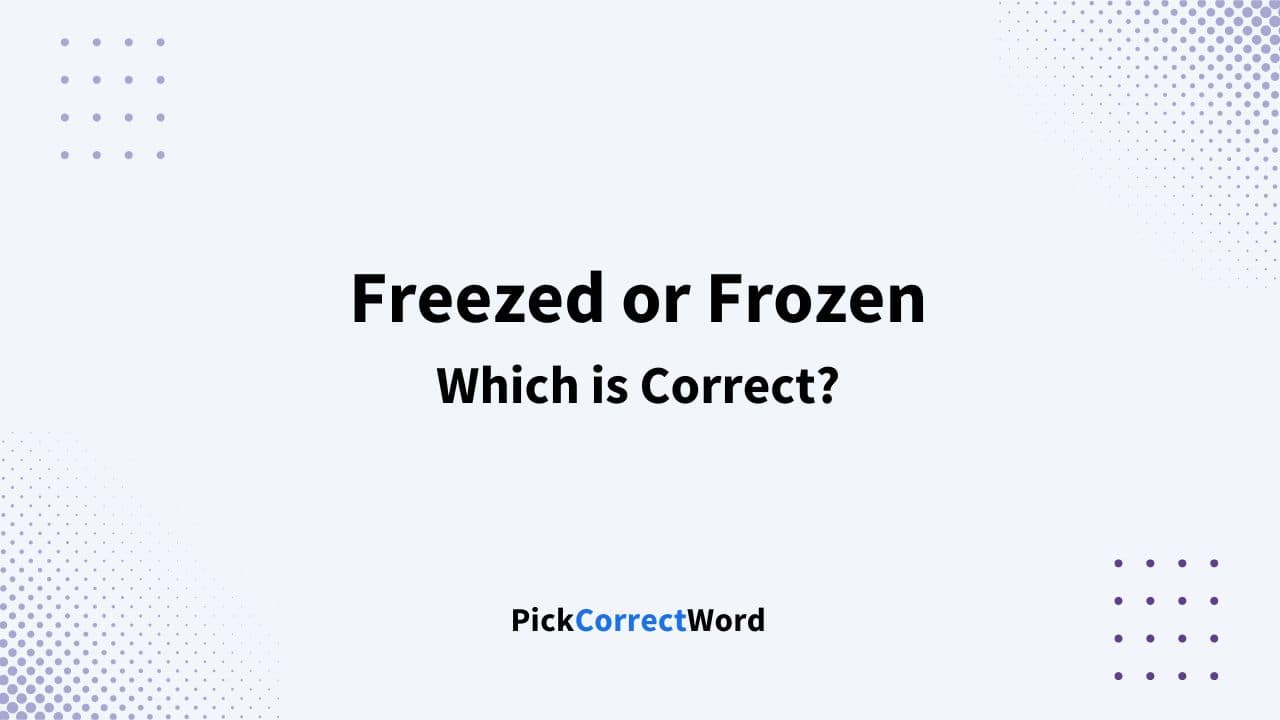You might wonder whether to use freezed or frozen when you’re referring to something that’s turned solid due to cold.
Frozen is the word you use when something has become hard because of extreme cold. For example, ice cream is kept frozen to keep it solid.
While “freezed” might sound like it should be a word, it’s not actually correct in proper English. You won’t come across it in most dictionaries or English lessons.
Freezed or Frozen: Which is Correct?
“Freezed” isn’t a word you’ll find in standard English. So, between the two, “frozen” is the correct option.
Examples:
- “The lake has been frozen for days now.”
- “The food was already frozen when she tried to separate it.”
Since ‘freeze’ is an irregular verb in English, so its past forms are ‘froze’ and ‘frozen’.
Keep these simple rules in mind, and you’ll be able to use ‘freeze,’ ‘froze,’ and ‘frozen’ correctly.
Froze vs Frozen: When To Use
Knowing when to use ‘froze’ or ‘frozen’ is important in English grammar because they are different forms of the same verb.
‘Froze’ is the simple past tense, while ‘frozen’ is the past participle.
Simple past: Froze
The past tense of ‘freeze’ is ‘froze.’ You use this to talk about something that happened in the past.
Examples:
- Yesterday, you froze the leftovers from dinner.
- Last winter, the lake froze solid.
Past Participle: Frozen
The correct past participle of ‘freeze’ is ‘frozen’. You use this form in perfect tenses and passive voice.
You use ‘frozen’ with helping verbs like ‘have’, ‘has’, or ‘had’ to talk about an action that is finished at the time of speaking, or to describe a current state that resulted from a past action.
Examples:
- The leftovers have been frozen for three days.
- The pipes have frozen due to the extreme cold.
Other contexts for the use of the word ‘frozen’
- Weather: You can use ‘frozen’ to talk about water that has turned into ice because of very cold temperatures. For example, “The lake was frozen solid.”
- Cooking: In cooking, ‘frozen’ talks about food that has been made cold to keep it from spoiling. Example: “The frozen peas are in the freezer.”
- Medicine: Doctors use ‘frozen’ to talk about a body part that can’t feel anything because of extreme cold or not moving. For instance, “I have a frozen shoulder because of not exercising.”
- Finance: In finance, when assets or accounts are ‘frozen’, you can’t use them for a while. For example, For instance, “The court ordered that his assets be frozen.”
- Technology: In computers, ‘frozen’ means a system or program isn’t working. For instance, “My computer screen has frozen.”
- Feelings: You can use ‘frozen’ to talk about feeling emotionally numb or not being able to react. For example, “She was frozen with fear.”
- Legal: In legal terms, when proceedings are ‘frozen’, they are stopped for a while. For example, “The judge ordered that the case be frozen until new evidence is presented.”
examples of using ‘Frozen‘ in a sentence:
“For lunch, enjoy your sandwich with a side of frozen grapes.“
“The pipes frozen overnight caused a delay in the morning routine.“
“Your frozen expression revealed your shock at the news.“
“Keep the dessert in the freezer until it’s completely frozen.“
“Watch your step on the frozen pond to avoid slipping.“
“Pack the meat in frozen ice packs to keep it fresh during transit.“
“She treasured the moment, feeling as if time had frozen.“
“The leftover food must be frozen to prevent spoilage.“
“Marvel at the beauty of the frozen waterfall in the winter landscape.“
“Ensure the fish is thoroughly frozen before storing it long-term.“
Frequently Asked Questions
What does ‘frozen’ mean when referring to a bank account?
When your bank account is described as ‘frozen,’ it signifies that access to the funds is restricted and you cannot make withdrawals or transactions. This could be due to several reasons, such as suspicious activity or legal proceedings.
What tense is used for the future form of ‘freeze’?
To refer to the future tense of ‘freeze,’ use ‘will freeze.’ For instance, you might say “The water will freeze if the temperature drops below zero.”
Is it I’m freezing or frozen?
The phrase “I’m freezing” is correct when you’re expressing a personal feeling of extreme cold in the present moment. “I’m frozen,” however, would typically be used metaphorically or to indicate that you feel extremely cold to the point of not being able to move.


